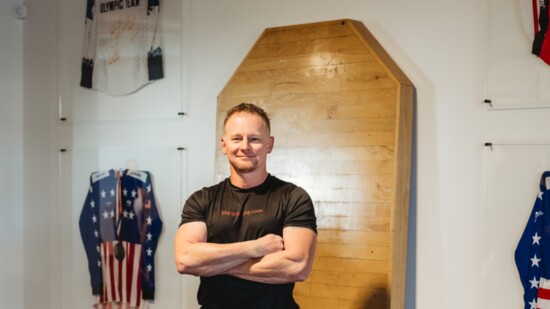In 5th grade, after submitting an assignment on his career goals, Kenth Fallen’s teacher pulled him aside and said, “You are kind of a little guy and the chances of you being a pro athlete are slim to none. And you can’t really make a living doing PE.” But if you ask Fallen now, he’d tell you that he is currently living out his dream career.
Fallen started BMX racing when he was 10 years old and would later become the first person from New Mexico to win a professional championship title in the sport. In 1989, he started racing in the USA BMX Grand Nationals – the largest race in the world. He spent years competing in the event as an amateur, but never made the finals until 2002. “It took me 13 years of going to that race and that’s the only time I made it to the main event.” He turned pro in 2002 and continued to race at the Grand Nationals for several years. As a pro, he didn’t make the finals again until 2008 when he went on to win the overall championship.
It wasn’t easy for Fallen to get to the pro level. The biggest challenge he faced as a BMX racer was a lack of resources. Early on in his racing career, the sport was still in its infancy, and he didn’t have access to many coaches or scientific information that could help him develop his racing skills quickly.
In his first year of college, he started weight training and that took him from being nationally competitive to nationally dominate as an amateur. This intrigued him and he wanted to learn more about weight training and other skills that he could implement to improve his racing abilities. “Any success always comes from the pursuit of knowledge. Pursuit of being better. And taking multiple resources from other sports and from other coaches.”
His racing career spurred his interest in exercise science, and he used his BMX racing income to pay for his master’s degree. He wanted to continue to learn so he could become a better pro athlete. But Fallen realized that eventually his professional career would end, and he would need to find a new profession. Everything he learned about himself, and the sport led to his decision to start coaching.
He started his coaching business, LifeSport as a way to help young BMXers advance in the sport. He likes to scout athletes that already have an advanced skillset so he can help push them to the next level. When families ask him why their children should train with him, his response is, “I’ve already done all the research and development. I’ve already made all the mistakes. I already have all the science to back up what I’ve been doing. And if you guys experiment long enough, you’ll get it, or we can just cut to the chase and we can start day one with what I know actually works and is scientifically proven.” He wants to give racers a pathway to get to the same national race that he won 16 years ago. In addition to training athletes one on one, he has coached the USA BMX World Championship Team since 2008, and even served as the head coach up until 2020.
LifeSport has grown beyond just training BMX racers. Fallen has built a team comprised of personal trainers and a physical therapist, all with different fitness and health backgrounds. The LifeSport team provides high-level training for people of all ages, genders, skillsets, and goals. He knows that anyone starting their fitness journey will face challenges, it’s not easy, but he wants LifeSport to be a resource for people. He doesn’t want his clients to hold themselves back from their full potential. “Start with something. You don’t need to be all in or all out. Even if it’s going to the gym for 20 minutes, that’s way better than nothing.” He wants his clients to have realistic expectations for themselves, so he starts off by identifying small milestones that they can work towards. His philosophy is that working towards small progress is better than no progress. He learned this early on in his racing career and he carried that with him into his coaching career.
"Any success always comes from the pursuit of knowledge. Pursuit of being better. And taking multiple resources from other sports and from other coaches.”
